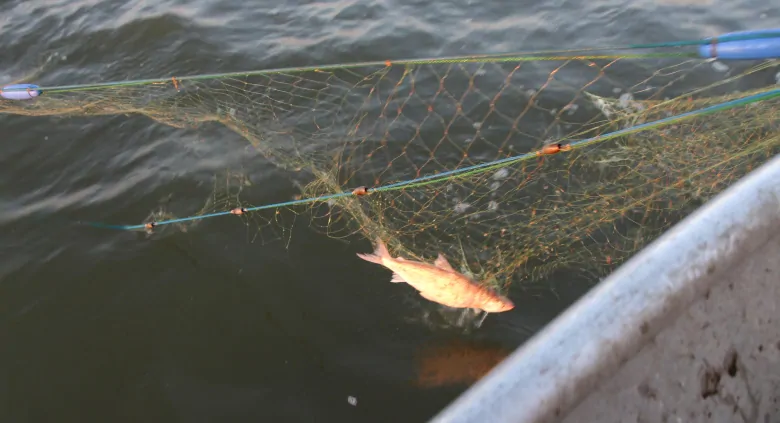As the commercial fishing season gets underway on Lake Winnipeg, a policy requiring fishers to use new nets is getting tangled up in global supply chain challenges.
A legislative change that came into effect in April means commercial fishers need to use gillnets with a mesh spaced 3.5 inches apart, as opposed to three inches.
The province maintains the change will allow smaller walleye and other fish to squeeze through the bigger net webbing without being caught, giving them a chance to breed more before ending up on a dinner plate.
But the change has drawn the ire of many Lake Winnipeg fishers, who have been using the nets with the three-inch mesh for decades.
In addition to hitting fishers with a drop in demand for Lake Winnipeg fish, the COVID-19 pandemic has caused supply chain delays that are making it hard for local net wholesalers to meet demand for new nets.
Third-generation Lake Winnipeg fisher Kris Isfeld is one of many against the transition to new nets. He recently wrote a letter to the premier and the resource development minister outlining his concerns.
Those concerns include the nearly non-existent demand for walleye in the hospitality and restaurant industry right now, as well as supply chain delays sourcing nets.
“For most of us, over 90 per cent of our nets are now illegal. For some of us, 100 per cent of our nets are now illegal,” reads Isfeld’s letter.
“Due to COVID, our export markets, where we sell all of our bigger fish, are closed. Due to this regulation change imposed by your government, our local markets, which demand the smaller species (caught by the now illegal nets) cannot be supplied with the species/sizes they require.”
Isfeld said nearly every time in the past six months he’s tried to buy the nets he needs, local wholesalers have been sold out or had short supply.
“With COVID and with the closure of the export markets, I can’t afford to even go buy the nets if they were available,” he said.
Isfeld started fishing Thursday, and rented a few nets from another fisher who he says can’t justify fishing due to the slump in the market.
Sean Johnston owns Harvester Fish Net Company in Selkirk, one of two commercial net sellers in Manitoba.

He has struggled to bring the new nets in from overseas manufacturers.
“It’s not a great situation this time of year,” he said.
“Usually spring is our best season as far as net supply … but this one will be a significant downturn in business.”
Earlier this month, Manitoba Agriculture and Resource Development Minister Blaine Pedersen said the shift to the new nets is about creating long-term sustainability in the fishery.
Fishers claim the provincial fisheries department has no scientific evidence to support the change. They also asked to postpone the changeover in May, but the province refused.
Pederson said at the time fishers have been aware of the new requirements for more than a year.
Johnston said net wholesalers weren’t looped in quite as early.
“While they claim they gave the fishers a year or more to make the change, they didn’t give us any heads up,” he said.
“As soon as they announced it was in the works, everyone stopped shopping for the old sizes, so we were stuck with … a significant financial burden as far as clearing inventory,” said Johnston.
He said two-thirds of his warehouse is still full of the old nets that he will never be able to sell.
Johnston has a shipment of the new mesh coming in next week. It will supply two or three of the many outfits he normally helps get ready for spring fishing.
“It’s not nearly enough to handle the changeover that’s going to be required.”

